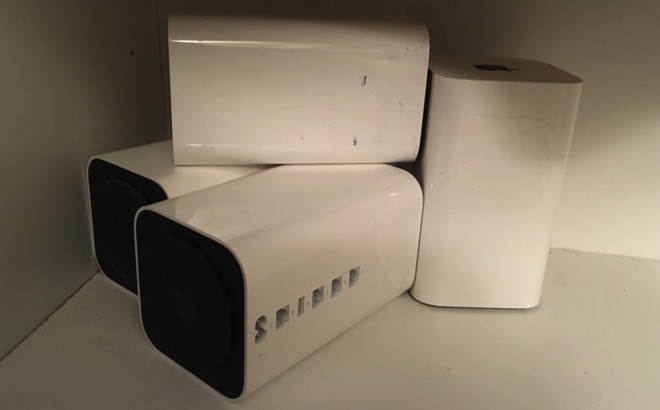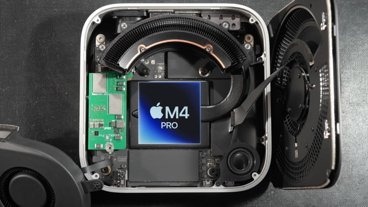Apple on Thursday announced the official death of its long-running AirPort Wi-Fi router line, a development many believed to be an inevitability after the division responsible for its development was axed more than a year ago.
Apple confirmed the demise of its base station lineup in an email to AppleInsider, saying existing stock will be sold through the company's online and brick-and-mortar stores, as well as authorized resellers, until supplies are exhausted.
News of the discontinuation comes more than a year after reports claimed Apple broke its AirPort division apart, a sign that it planned to soon ditch the branded wireless hardware. At the time, employees working on AirPort development were supposedly reshuffled to other areas and projects within Apple, including Apple TV.
"The original AirPort wasn't really ours, we bought that," a person familiar with the situation told AppleInsider. "[Apple] supported that for a very long time, even after we built our own, re-organized the division, and some of the guys we brought on to advance the platform were twice-removed."
For many, AirPort's death comes as no surprise.
The last major upgrades arrived some five years ago when the AirPort Extreme and Time Capsule models received an aesthetic makeover and 802.11ac support. Apple touted a new "mini tower" design with a beamforming antenna array to aid in long-distance transmission. Apple's AirPort Express was last updated in 2012 with a design revamp and dual-band 802.11n compatibility. The portable Wi-Fi router never received 802.11ac treatment.
Apple dropped hints that AirPort was not long for this world in January, when the Linksys Velop series became the first third-party router to be sold through Apple's online and physical stores.
In the interim, Apple pushed out the rare software update to keep the routers free of bugs and major vulnerabilities. In 2016, for example, the company issued new firmware to fix a Back to My Mac compatibility issue. Most recently, Apple patched a critical "KRACK Attack" exploit late last year.
AirPort was introduced in 1999 and became a hardware mainstay for nearly twenty years, though its evolution often lagged behind partner Mac and iOS devices that routinely integrate cutting edge Wi-Fi communications technology.
Apple began to build out its AirPort line starting with the first AirPort Extreme in 2003. That was followed up by the AirPort Express in 2004 and the hard drive-equipped Time Capsule in 2008. It was Time Capsule that enabled seamless local backups via Time Machine in OS X, a feature that continues through to macOS High Sierra.
Update: Apple has posted a support document detailing its recommendations for choosing a Wi-Fi router to use with its devices. The company suggests hardware supporting 802.11ac, simultaneous dual-band networking, WPA2 encryption and MIMO or MU-MIMO support. Interestingly, Apple says mesh networks are a good choice for areas that are large or difficult to cover.
 Mikey Campbell
Mikey Campbell







-m.jpg)






 Marko Zivkovic
Marko Zivkovic
 Mike Wuerthele
Mike Wuerthele
 Christine McKee
Christine McKee
 Amber Neely
Amber Neely
 Sponsored Content
Sponsored Content
 Wesley Hilliard
Wesley Hilliard

 William Gallagher
William Gallagher








106 Comments
Too bad! AirPort Extremes are rock solid and are still about the cheapest way to roam seamlessly between base stations on the same network using identical SSIDs. Newer mesh network hardware can do this but they're also proprietary and have their own limitations and problems.
That comment about the original AirPort having been bought is a lame diversion from the fact that Apple was the first major OEM to champion wifi. Like that excuses the company from exiting the business, when it had a huge lead over the competition. Simply, leads are lost if efforts aren't adequately funded going forward.
Q: what wifi hardware does Apple now endorse for use with its products?
Thing is, the apple of old provided a complete ecosystem that just worked.
now, there are new innovative ideas that are released, then just left to whither with no further development (eg 3D Touch, HomeKit) or half arsed (eg homepod). The airport could have been the classic marriage of hardware and software that is greater than its parts. The AirPods seem to be an exception that reflects the apple of old.
airport could have evolved into an out of the box mesh system that was trademark Apple easy to set up. And a reference hub for HomeKit that also ‘just worked’. Instead it was neglected. Like far too much of The Mac line.
Still the best router, WiFi unit I’ve ever owned. Built like tanks and reliable. “Reliable” being the key word. Never had to reset the routers once, where the D-link, netgear, and Linksys required monthly resets or their hardware failed.
What other brand is there that has that kind of dependability and ease of use?
This is quite disappointing. Yes, there are alternatives, and yes, we knew this was coming, but I always thought that the Airport was an important part of the Apple ecosystem.
A logic similar to the one with this decision could easily be applied to headphones, AirPods, HomePod, AppleTV, and pretty much every Apple-made accessory for the Mac, iPad, iPhone, iPod, and Watch.